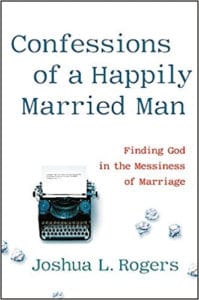Excerpt:
Mr. Joshua Rogers: We come to marriage with these ideas of who we are and who we’re going to be as a spouse. And we show up. And that’s probably, you know, for most of us, it’s shattered. And we have an opportunity. We either face that and face who we really are and grow closer to God and closer as a couple. And if we don’t, then what we do is we skip out on intimacy.
Jim Daly: Yeah.
Joshua: You can’t be intimate with one another fully if you’re not fully open with yourself, open with the Lord and open with each other.
End of Excerpt
John Fuller: Joshua Rogers and his wife, Raquel, are our guests today on Focus on the Family. They’re going to offer encouragement for finding God in the messiness of everyday married life. Your host is Focus president and author Jim Daly. And I’m John Fuller.
Jim: John, we say this from time to time, but I don’t think there’s a perfect marriage. Now, I know someone’s going to say, “I’ve got the perfect marriage.” Please let us know about that. And, uh, I’m sure it’s 99.9% perfect, but as fallen creatures, I just can’t be convinced that we’re perfect yet. Right?
John: Not – not for most of us.
Jim: And certainly, when you have marriage, it’s too imperfect people coming together. You usually get imperfect marriages. It doesn’t mean we don’t work on them, though. And we want to strive every day, especially for Christians, in order to show God’s glory in our relationship. We want to model a loving Christian marriage so others might see it and be drawn toward it. Right?
John: Well, I hope that that’s the goal for our listeners. I trust that as they have listened along, they’ve heard us addressing this topic before of marriage and being vulnerable is a key aspect of having a better, deeper relationship with your spouse. We’re talking, as I said, with Joshua and Raquel Rogers. They have been married for 12 years and have three children under the age of 10. Joshua has been a frequent contributor to our young adult ministry here at Focus, Boundless, and he’s written a book called Confessions of a Happily Married Man: Finding God in the Messiness of Marriage. We do have copies of that book at focusonthefamily.com/broadcast.
Jim: Joshua and Raquel, welcome to Focus.
Joshua: Thank you.
Mrs. Raquel Rogers: Thank You.
Jim: It’s good to have you here. Um, let’s jump right in with your story. There was a night early in your marriage when it was very clear that your relationship needed some work. What was going on and what happened that night? Every couple’s leaning in right now going, “Oh, yeah. We had that night.”
Joshua: I think you’re probably talking about the most humiliating moment of our marriage ever.
Jim: What a great place to start.
Joshua: What a great place to start.
Jim: (Laughter).
Joshua: So, we were actually on vacation in Puerto Rico, but it wasn’t much of a vacation. Raquel had just had our first child and she was three months old. We were sleep deprived. We were constantly at odds with each other. So, we’re in Puerto Rico, her family’s there and we try our best when we’re with her family to behave as well as we can.
Jim: (Laughter).
Joshua: But there was one day where we started having one of those whisper fights in the living room and Raquel said, “Go to the bedroom.” So, we go to the bedroom.
Jim: Oh, yeah. You called him out.
Joshua: Yes.
Jim: “Let’s go to the bedroom and finish this.”
Joshua: Oh, we – and we were finishing it. There were accusations, insults going back and forth. And all of a sudden, I looked over to my right and I said, “Oh, my gosh, the baby monitors there.”
Raquel: Yeah. So, I go to the living room immediately and I…
Joshua: That’s where actually the speaker for the baby monitor was.
Raquel: That’s right.
Jim: (Laughter).
Raquel: And I realized that I could hear Josh moving around in the room and I look to the kitchen and my grandmother’s there and I’m – just hits me. “Oh, my gosh. She just heard everything.” And my aunts walking down the hallway. They just heard everything that we were saying. And so, that was a moment of…
Jim: How did that go?
Joshua: What was there to do at that point?
Jim: And what did you say to them? What they say to you?
Joshua: Nothing. We learned – I think it was 10 years later they heard the whole thing. You know, our aunt finally told us.
Jim: But you knew.
Joshua: Oh. Of course.
Raquel: Oh, I definitely knew. And honestly, what we did was pretend it didn’t happen. And…
Jim: Okay.
Raquel: …That’s really kind of…
Joshua: A metaphor for what our marriage was like.
Raquel: …A metaphor. Well, no, not just what our marriage what I think what we do in general, when we’re kind if exposed and caught in sin, what do we do? We cover up. We hide. Let’s just pretend that that didn’t happen, and you move on.
Jim: (Laughter).
Raquel: But that was, uh, a really an epic moment, but we had we had lots of little moments like that where God was really starting to be like, “Okay.” Put His finger on something. There’s something that I want to show up and I want you to come to Me and say, you know, “I’m right here.” Adam and Eve, you know, Genesis three right after that moment that they sin what happens? God says, “Adam and Eve, where are you?” They had already covered up. They’d hid. That’s what we all do in our marriages. We hide and we cover up. We pretend. Self-defense mechanisms. Um, and so, that baby monitor story is really a moment of – really an epic moment of God being, “Here’s an opportunity. Are you gonna come to Me?”
Jim: Yeah.
Raquel: You know, “Are you gonna hide and cover up and pretend or can you just confess?”
Jim: Well, and let me ask you this. I mean, given you lived on both sides of this equation, meaning putting forward this perfect facade or better facade and then being caught behind closed doors with the baby monitor, what compels us all? I mean, you guys aren’t unique in that way, right?
Raquel: Mm hmm.
Jim: I mean, this is what marriage is about, especially early, and especially with the pressure of having three young children being sleep deprived, like you said. You’re working from a deficit, but you’re still trying to present the Pinterest family, right? Here we are. We’re good. We’re perfect. Praise God. Why are we in that spot rather than being vulnerable, authentic and real?
Joshua: I think a lot of people are like that and we were on that trip. But I think that one of the strengths of our marriages is – is that people have known when we had issues. And the reason they’ve known is because we tell them. Some of the times it was a healthy way. I’m in a men’s small group. I’m like, “I don’t get it. I’m angry with her.” At the same time, you know, the next week I’m talking to how great my marriage is, but our marriages are not going to be safe if they’re insular. And so, we from the beginning have been really honest with people and sometimes it was embarrassing. I think her family got tired of hearing us fight around them.
Jim: Huh.
Joshua: And so, we actually weren’t trying to fool anybody on that trip. Yes. Because, you know, we were never around those family members. But, in general, I think one of the strengths of our marriage is the willingness to be vulnerable.
Jim: Yeah.
Raquel: Yeah. And I think a lot of people – what – we all have opportunities in everyday life. Marriage is a perfect gift, a mirror for your insular and – and you have opportunity. You have enough pressures happening around you where stuff starts to bubble off. You know, your ways of pretending and hiding, your sin patterns. They come up. But what do you do with that is really what’s important. You can either deny and say, “I’m not going to face that part of myself.” Or you have the opportunity – and I think it is a strengthen our marriage – to say, “All right. God has shown this to me enough times that I can submit and come to Him and allow Him to bring healing and wholeness and transformation.” But it really brings humility instead of denial.
Jim: Yeah, but it is a process, and I think that’s part of it. I think marriage – that the Lord put marriage in our hearts and in our institutions as a way to make us better. I mean, really. Let me, though, explore. Joshua, we’ll start with you. Raquel, we’re coming your way next. But, um, your childhood – so many guests, John, that we have on the broadcast, the Yerkoviches and Gary Chapman and others. There’s so much that we learn in our childhood that trigger us. Um, and then we get married in our 20s typically and those triggers (laughter) start getting punched again, whatever that might be. Insecurity, you know, whatever it is. And it leads to combat in the marriage rather than growth. Hopefully over time it leads to growth. The shorter the time, the better. So, Joshua, in that respect, your childhood experiences, how – how did you see those affecting your marriage?
Joshua: I grew up in a Christian home with two Christian parents. They loved each other. Um, they loved the Lord and the deck was just stacked against them. There was just one catastrophe after the – the other. Two siblings, you know, from my dad’s first marriage who died. And, you know, the – the dominos fell over and over again until when I was 12, you know, my dad, he had left before just to go find himself. And he said for the last time, “I’m leaving.” And Cinderella took that glass slipper and she threw it at him and said, “Go away. I don’t want to see you again.” And I watched their marriage collapse over the course of that time. And it was so confusing because you’ve got your dad who’s supposed to be playing this role of, like, Father God in your life, and then he’s abandoning your mom. And what lesson I learned is that marriage is not safe. Um, it is dangerous. And so, I became extremely legalistic in college. And I was like, I – I – this is a quote, “I’m going to be a eunuch for Christ.” Um…
Jim: Because it’s easier?
Joshua: Because I am going to distance myself from the thing that can hurt me. So, I would say, “I’m not going to date because I don’t want to have a mini-divorce.” But what I was saying was, “I don’t want to ever put myself in the position my parents did.” So, what I wanted out of marriage was – and I eventually came to the place that I wanted it – was it’s either going to be awesome or either it’s going to be a mess. My marriage has to be awesome. So, when we would butt heads, it would agitate me so much because it would bring out not just my weaknesses, but the weakness of the whole ideal that I had.
Jim: Mm. Boy, that – I mean, that’s powerful. And that’s, you know, a – we’re going to explore more how (chuckling) you deal with that. But that is insightful as to what you were seeking in your marriage. So, you had this incredibly high bar, obviously. Um…
Joshua: Mm hmm. Right. And the bar was not what my parents had instead amazing.
Jim: You know, when you say to yourself, “Lord, I’m never going to do that.” You know what He hears? “Lord, send me in this direction so I can learn the things I need to learn.” (Laughter)
Joshua: That’s right. That’s right. That’s right.
Jim: So, Raquel. I mean, okay, so you get in this marriage. Did you realize that about Joshua? Did you know this high expectation of marriage and commitment was there? Did he talk about that?
Joshua: You hardly knew me.
Raquel: Um, yeah. So, our dating story was very short.
Jim: What happened?
Raquel: We met and four months later he proposed. Five months after that, we were married. And so, in less than a year, we met, were married. And really, it was as soon as we got engaged, we started to butt heads immediately. You know, fighting for control and having to make all these life changing decisions in a very quick period of time. And so, I wasn’t necessarily thinking about his expectations of marriage, although we did go over that in premarital counseling and butted some heads some more. But we were just immediately started hashing it out. We culturally are very different. You know, he’s – comes from a Southern patriarchal culture and I’m Puerto Rican and I come from a matriarchal culture where there are amazing, strong women. And so, we didn’t notice it at the time, but we were butting heads over our expectations of marriage. And, um…
Joshua: I think it was probably in engagement, though. I mean, literally, it had been just I mean, tiptoeing through the tulips. And then the next morning we start talking, negotiating…
Jim: (Laughter).
Joshua: …And that’s where it all falls apart. And I think that’s so much of any of our conflicts have come back to negotiation. And, um, I think what I did not even admit to myself until maybe last year is that then and in a lot of my marriage as this like, “I’m the southern man, I’m this strong spiritual leader” that I was like, “That woman is not going to tell me what to do.”
Jim: So now became combat.
Joshua: Oh, yeah. And – but from her place – I mean, this is a – she comes from a family of some strong, like amazing women and…
Raquel: And I was saying the same thing internally. “I’m not going to let him tell me what to do.” And so, but this was really perfect opportunities for us to really look at ourselves. It’s so easy in marriage going back to the Garden of Eden to point the finger at the other person and say, “He did it. She did it. You know, Satan did it.” But really, in marriage, it’s so important – what has helped us grow is looking within ourselves and say, “God, why am I responding this way? What do You want me to see about me?” And most importantly, “What do you want me to see about You? Because You are right here in the everyday, ordinary, messy, big life decisions, hard decisions and, you know, raising kids life.”
Jim: Yeah. And, you know, incorporating that whole story of the baby monitor. It sounds like your immediate family kind of backed up. Nobody stepped in. It sounds like to say, “Hey, let’s help you sort this out.” There was a couple that caught your attention. Why did they catch your attention and how did you respond to them?
Joshua: Well, it was before I got married. You know, when I – I did not believe really in marriage. I said I did. But I did not believe…
Jim: Well, what a great candidate, Raquel. Way to go.
Joshua: (Laughter).
Jim: You caught the guy
Jim: (Laughter).
Joshua: That’s right. So, I didn’t – I didn’t believe it was – it was something that was safe. And I met this couple. Name was Sean and Beth and I – we went to church together and they just loved each other. They brought me into their lives. And I saw them walk through difficulties together, parenting. I saw them have, you know, disagreements. And they managed to, through all of this, stay in love. And I mean, there was a strong care for one another. It was rooted in Jesus. And there was passion and they were funny. And they were the ones in the back of my head that always told me, “You can believe in love. It’s real.” And that’s what we want for our marriage today.
Jim: Huh.
Joshua: We want people to see. You can meet God in the messiness of marriage. And we are not afraid to do that. We’re…
Jim: So, the good, the bad and the ugly.
Joshua: That’s right.
Raquel: Mm hmm.
Jim: Lay it out there.
Joshua: In fact, the good, the bad and the ugly is where you can find Him everywhere.
Raquel: And then there’s freedom in that. You know, when we pretend, you’re only hurting yourself or your marriage or your kids and the people around. When you’re honest and Joshua can talk about integrity in your view. He really – it was a turning point for him especially to look around, to interview some of his friends and the people close in his life and say, “What – what am I like? What am I really like? What is it like to be my friend?” Or, you know, you can talk more about that. But…
Joshua I – so, I actually when I was in my second year marriage. I was, um – and now to be clear, Raquel and I’ve always liked each other.
Jim: Yeah. Okay.
Joshua: There’s always been a passion. Some….
Jim: It’s good to hear.
Joshua: …Sometimes it’s misdirected. Um, but I was in a small group with a couple of guys. And one night we were talking and one of the guys said to me – I was like, “Hey, guys, do you – it there anything in my life you know that you think I should change?” And my friend Pat said, “You know, the way you speak to Raquel sometimes really embarrasses me.”
Jim: Wow.
Joshua: And I thought, “What?” She’s…
John: Now, did you ask the question expecting, I’m clean. I’m good.
Joshua: Mm hmm. I – with him I said, “You know, Pat, you’re just too nice to me.” And I’m like – I was like, “I’m gonna give it a try, though.” And I ask him, and he immediately told me, um “The way you speak to Raquel really embarrasses me.” And I was so shocked because I was like, “Her? She’s the embarrassing one.” I didn’t realize that I actually had something going on. And so, my other friend talked about this book, Integrity, by Dr. Henry Cloud and this idea of an integrity interview where I would go around and ask questions of friends and say, “What is it really like to be on the other end of my life?” So, I talked to five people. The first one was Raquel and, you know, she’s crying and she’s saying the things that I’ve heard before. And I’m taking notes and smiling and nodding politely and not defending myself. But I walk away from it and I’ve been there, heard that. But what broke my heart was the next four people because they said 80 percent of what she’d said.
Jim: (Chuckles).
Joshua: And that was the moment – that was a huge moment for me and a turning point, because I actually thought for the first time, and I’m not trying to be funny, “She may actually be right. I mean, like, maybe she’s right.” That was huge. I think that there are spouses that never get to that point.
Jim: Yeah, that’s a great point, because I think you’re absolutely right. And, uh, just being vulnerable, I guess that’s called humility. Right?
Raquel: Mm hmm.
Joshua: And it was amazing that God even gave me the grace to be humble like that.
Jim: Well, let’s speak to that, because I’m sure there’s listeners who are going, “Okay. I’m connecting with what you’re saying.” But you have two paths in front of you at that point. You can hear your four friends affirm what Raquel has said and you can get hard of heart or you can be supple and say, “Okay. I’m blowing it. What do I need to learn?” Speak to that other kind of way you could lean. Did you have that feeling at first? Did you have the, “Wait a minute.” The rigidity – did that spring up? Joshua: I was – I was a mix of angry and depressed after those two weeks…
Jim: Huh.
Joshua: …Because the first thing you want to do is turn on them. “You just don’t get me. You don’t understand me.”
Jim: Let me explain myself.
Joshua: Yeah, I’ll explain. But the thing that I was told to do if I was gonna do the interview is don’t defend yourself.
John: Hmm.
Jim: Well, you are an attorney.
Joshua: That’s right.
Jim: That’s got to be really hard.
(LAUGHTER)
Joshua: It was really hard. It’s been hard on her being married to an attorney. Um, I’m always…
Jim: It’s hard on all of us.
(LAUGHTER)
Joshua: ‘Cause I’m always trying to make my case. But the thing is, is I want Jesus. I love Jesus. And I love Jesus so much that I’m willing to meet Him in my marriage. I’ve – I’ve come to see after 12 years, I’m really – in writing Confessions. The thing that hit me as – I knew where the book was going, but I was not prepared to see just how much Jesus had manifested Himself and this amazing woman who’s sitting here with me. I didn’t realize that all of the head-butting, all of the love that we had and the fun times and the kids and the hard times and the crises we went through, He was there. And I all of a sudden realized, it’s you, Jesus, that was You. And I think that was probably the first – because after those first two weeks, there was a part of me that stopped and said, “God, is there something that needs to change here? What – what needs to go on?” And I – I just pursued Jesus in it and that’s what made the difference.
Jim: But those are all the right decisions. That’s what’s so good. And I guess my earlier point was men don’t always, even in those circumstances, we don’t make those right decisions. We make wrong decisions and that’s where we suffer.
Joshua: Well, I think we can’t…
Raquel: But really, this wasn’t overnight.
Joshua: Yeah.
Raquel: I mean, he did these integrity interviews in the first couple years of our marriage, but, you know, year after year, we have opportunities every single day to turn around. It’s in the little things where we get to practice. Okay. I’m going to choose life. I’m going to choose humility. Okay. Here’s an opportunity with my kids or my wife to just come exposed before the Lord. Here I am, Lord. There’s some weakness. There’s some sin. There’s some things that need transformation. Um, and so here I am. I can – I can bring God into it. A lot of times we just try to live life on our own and – and try to fix these things on our own. But that’s just not how it’s supposed to be.
Joshua: Well, I think we come to marriage – we come to marriage with these ideas of who we are and who we’re going to be as a spouse. And we show up. And that’s probably, you know, for most of us, it’s shattered. And we have an opportunity. We either face that and face who we really are and grow closer to God and closer as a couple. And if we don’t, then what we do is we skip out on intimacy.
Jim: Yeah.
Joshua: You can’t be intimate with one another fully if you’re not fully open with yourself, open with the Lord and open with each other. If you want intimacy that’s what it takes. So, for the man or the woman out there who shuts down and says, “I’m fine. I’m not going to take this from him. I don’t need to hear this. Um, I’m not the one who’s going to be the first to change.” Well, you just forfeited intimacy in your marriage. Sorry.
Jim: There you have it. Um, you’re listening to Focus on the Family today. We’re talking to Joshua and Raquel Rogers. Joshua’s wonderful book, Confessions of a Happily Married Man, is the topic today.
John: And it’s available from us here at Focus on the Family. Get your copy of that book when you call 800-A-FAMILY. Or stop by focusonthefamily.com/broadcast.
Jim: (Chuckling) Uh, one of the issues, as I was reading the book and looking at the prep for the program at home this morning – I mean, Jean and I were talking about it and she – she lit up. She goes, “Oh, people are really going to benefit with this.” And one of the things is control. You’ve touched on it a couple of times, but I think it’s probably one of the biggest issues in marriage today is this battle for control. And I want to hit that one head on and how you can get to the point where you can let go. And, you know, not standards, not moral principles. We’re not talking about those things, but just the need to control in the marriage. So, either one of you jump out there, how you let go of your controlling temperament.
Raquel: Yeah. I mean, I can definitely confess that that’s been one of my issues, control and being critical. And instead bringing God into it, bringing myself in my own issues into it, then speak – going back to your earlier point of what do I say to the women who are just, you know – they’re looking at their husbands and they’re just – they want to give up. I don’t know what to do anymore because he doesn’t want to grow, or he doesn’t want to pray, or he doesn’t want a change in these areas. Um, it’s to really trust God. And I know and I don’t say that – that’s not glib. Like you either trust God or you don’t. And you can pray, and watch God do a work, which is what I saw happen again and again, where I would see the Holy Spirit at work changing him from glory to glory. Little thing by little thing that he would change. And I just trusted. I just knew that God was at work not just in his life, but in my life, because he was doing the same thing in me. And so, really let go and let God be that third strand in your marriage and let Him really take place, not just, you know, at church or sometimes part of your marriage, but every day, like, “God, I might be here. Be near.” The Lord is near. “Are You near?” Yes, He is. And I saw it.
Joshua: And I think for me, control – the control issue has everything to do with am I willing to stop trying to control Jesus?
Jim: Hmm.
Joshua: Um, Jesus is working through your spouse. Let Him do what He’s going to do. I wrote this book. It was all but done. And the idea came up, what if Raquel wrote a little epilogue and I said, “I would like for it to be little because it’s my book.” Right?
(LAUGHTER)
Joshua: And she gave me a 3,200 word epilogue. And it was a chapter. It ended up being called “The Last Word.” And when I looked at that chapter, I was like, “Oh, my gosh.” I eventually got to the place where I realized this is not my book. This is our book. And what she’s done is beautiful. And if I had stopped that, if I’d insisted on her doing a little epilogue instead of that beautiful she – chapter, she writes at the end, that just brings it home. I would have silenced what Jesus was trying to do through that book.
Jim: Yeah.
Joshua: So, let Jesus do what He’s going to do through your spouse.
Jim: Yes. It is really good. And, you know, typically when we talk in this way, we’re gonna have a man or many men write and say, “Why are you bashing men today?” And I would only say if that’s where your – your feelings are going…
Joshua: Mm hmm. That’s right.
Jim: …We must be touching a nerve. If I could be that bold and there’s two responses. Do that evaluation. Look at your life. Ask your wife to give you some input. Ask your friends like you did, Joshua. Four of your friends to speak into your life as it pertains to your marriage. That’s the way to go with that. Writing us and complaining that we’re bashing men today – I’d use that energy differently. We’re not attempting to do that. What we’re trying to do is show where there may be some areas to improve in your marriage. And that’s the goal.
Raquel: And really my chapter where I wrote about examine. It’s not just about men. Men and women coming to the Lord at the end of the day in reflective prayer and saying, “Search me, oh, God. See if there’s any wicked way at me.” And to really wait with God to see if He’ll point anything out about your – your – the little spat you had this morning. Like, let’s go back to that moment in and – and review what happened. What happened in your heart? And so, that’s really been something that transformed us. It wasn’t just the integrity interview. It was a daily posture of openness and reflection before God and say, “Search me, oh God. Where do I need to change? What do You want me to see about me? What do You want me to see about You and about our marriage?”
Jim: There’s nothing that works better. I mean, that’s what we’re always saying.
Joshua: Mm hmm. Mm hmm.
Jim: I mean, couples that pray together, read the Word together, that divorce rate is really low, like one percent.
Joshua: Right.
Jim: So, I mean, you want to have that kind of fulfilled marriage. You’re hitting it even though you’ve been married, you know, a short number of years. You’re beyond your years in terms of the wisdom you’re bringing today. Thank you so much.
Joshua: You’re welcome.
Jim: What a great book. Confessions of a Happily Married Man. Joshua and Raquel Rogers, thank you for being with us.
Joshua: Our pleasure. Thank you.
Raquel: Great to be here. Thank you.
Jim: Let me turn to you, the listener. We have something that can help you in this area that Joshua and Raquel have been talking about today. It’s a free. It’s our online marriage assessment. It takes about five to seven minutes to complete and will identify some of the strengths and weaknesses in your own marriage. It’s a great place to start to take an inventory of where your marriage needs to go to get to the next level.
John: And I think, uh, we have about a million folks now who have taken that marriage assessment. Join in. Have some fun along the way. And find articles, as well, about almost any issue you might be facing in your relationship. All of this help is at focusonthefamily.com/broadcast.
Jim: And John, I love hearing stats like this one. In the past year, our broadcasts and other resources here at Focus have helped at least 800,000 couples build stronger and more satisfying marriages. That’s why we do this. And here at Focus we have a heart for helping couples not only stay together but enjoy God’s gift of marriage. If your own marriage is doing well and you share our passion for helping couples, we need your help. We’re behind on our budget this year, certainly due to COVID, and, uh, we’re struggling to keep up. And it would be great to hear from you right now. Maybe you haven’t given in a while or ever. Uh, be a part of the team. Let’s help more people strengthen their marriage, be a better parent, and even save a baby’s life. But we need you to be part of the team. So, contact us today. And when you give, we’ll send you a copy of Joshua’s great book, Confessions of a Happily Married Man, as our way of saying thank you.
John: And right now, we have a special matching gift opportunity, so when you donate, your contribution goes twice as far. Donate today and get the book by calling 800, the letter A and the word FAMILY. Or go to focusonthefamily.com/broadcast. On behalf of Jim Daly and the entire team, thanks for joining us today for Focus on the Family. I’m John Fuller inviting you back as we once more help you and your family thrive in Christ.





















